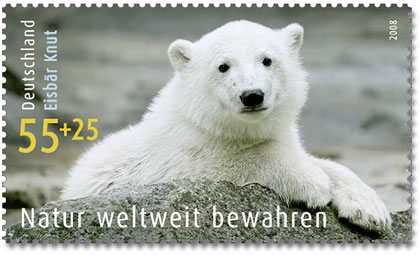Knut The Polar Bear Marks Last Profitable Days Of Zoos?
Written by Vegetarian Star on May 31st, 2011 in Animal Issues, Business.

Knut the polar bear made the Berlin zoo in Germany one profitable enterprise. The heart-warming story of a cub rejected by his mother and tormented by his sisters turned into one of 3.5 million visitors and over 30 million dollars between the years of 2007-2009 when Knut was growing up.
According to an article at MSN, those years were the only years the Berlin zoo actually made money.
The article continues to discuss the struggle zoos have with providing an educational experience for visitors while trying to attract enough of those visitors to continue with operations. The Berlin zoo is contemplating how to market the “Knut Brand,” even after Knut’s death.
Ingrid Newkirk, founder of PETA, says the glory days of zoos are coming to an end because more people are realizing how unsuitable many zoo environments are for wild animals.
“Zoo visits are declining because people can see actual animals in the wild,” Newkirk said. “They can see YouTube and National Geographic and the Discovery Channel. Zoos are struggling to make themselves sexy.”
In the United States, the Bronx Zoo in New York has also recently struggled with downsizing, closing of exhibits and pondering over whether charging more to its members will help generate funds or decrease visitors. Mayor Bloomberg’s proposed spending plan cuts the zoo’s funding by 50%.
Wayne Pacelle, CEO of the Humane Society recently suggested the idea of building a new economy that allows animals to thrive versus the way they have been traditionally used for human entertainment. This new economy would make profit off ideas like animal adoption, sanctuaries and conservation efforts.
Could the decline in the popularity of zoos be a good step in directing educational activities to settings that many activists consider better for animals, such as sanctuaries? Or will it force dozens of well-run instistutions that do care for animals–including housing some endangered species that find it hard to flourish in the wild because of man-made activities–to shut their doors on them?
Possibly Related Posts:
- Jon Stewart and Wife Tracey Stewart Adopt Horse
- Ringling Brothers, Barnum & Bailey Elephants Retire To Sanctuary
- SeaWorld Phasing Out Whale Breeding Program
- Ben And Jerry’s Launch Vegan Ice Cream
- Best Vegetarian Stories Of 2015













